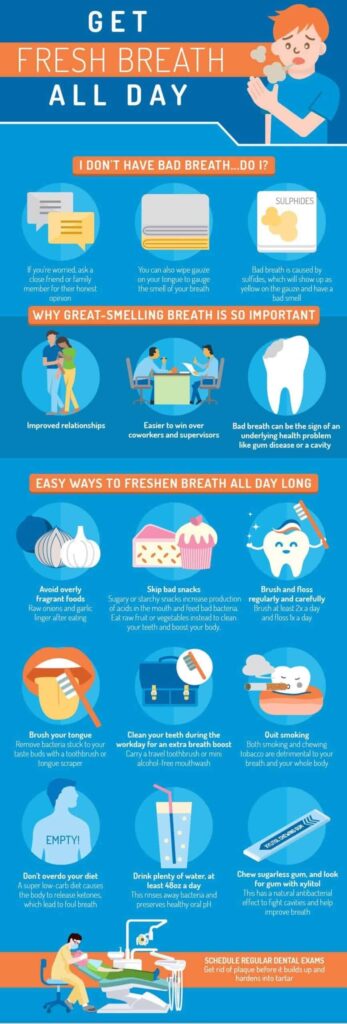How to Beat Bad Breath: Fresh Breath Day, August 6, 2022
August 4, 2022
In honor of Fresh Breath Day this month, we’re going to give you the reasons behind bad breath and tips to eliminate bad breath.
Do you struggle with chronic bad breath? Many people do, whether from their dietary habits, poor oral hygiene care, or even untreated medical conditions like periodontal disease or a tooth infection. The American Dental Association estimates that at least half of adults experience halitosis at least once in their lives, and can even be accompanied by an unpleasant taste. Some people don’t realize their breath is bad, while others are painfully aware, making them feel self-conscious.
Today we have some tips to help you address chronic bad breath. Halitosis or oral malodor are also names for this often embarrassing condition. The good news is, bad breath is highly treatable, beginning in the home with your daily diet and oral hygiene care.
Avoiding Bad Breath
Bad breath can begin with the foods you like to eat, having untreated gum disease, or poor brushing and flossing habits. You can only get rid of oral bacteria by brushing and flossing every single day, maybe even followed by an oral mouth rinse. You want to make sure that the sticky bacterial film, plaque, is removed from your teeth, gums, and even your tongue daily!
-Are you dehydrated?
The main cause of bad breath is having a dry mouth, whether from breathing through your mouth instead of your nose, especially when snoring. You need saliva to keep your mouth clean with the proper pH-containing antibodies to get rid of unwanted oral bacteria. Medications and salivary gland problems can also cause dry mouth. Water is your best friend here as it stimulates saliva production and washes away odor-causing bacteria.
-What’s in your mouthwash?
Next on this list is mouthwash, which ironically is used to fight bad breath! Just avoid using mouthwash containing a high alcohol content so it doesn’t lead to dry mouth and you should be alright.

–Is your food the culprit?
What you’re eating can leave you with smelly breath and the most obvious choices to avoid are pungent vegetables like onion, garlic, cabbage, cauliflower, and broccoli. Any foods that are high in protein, fat, and spices can leave your breath smelling bad. Citrus juices can bathe your teeth in acids that feed bacteria and the amino acids in dairy products can generate a sulfur smell if you eat too much.
–How’s your oral hygiene?
Do you skip flossing? Please don’t! Not if you want good breath and healthy teeth and gums. Brush twice a day or after eating for two minutes each time, and floss at least once a day. Flossing cleans the parts of your smile that your toothbrush can’t reach. You want to get those bacteria-feeding food particles out of your mouth.
–Is your gut bacteria prolific?
If there is an overgrowth of bacteria in the gut it can spread into the mouth. People with liver disease, kidney disease, or diabetes can also have bad breath from this gut bacteria.
-Do you use tobacco?
You probably already know this if you smoke or use tobacco, or are around someone who does, but using tobacco use can leave you with gum disease which is a primary factor of bad breath! Plus it makes your breath very unpleasant by drying out your mouth.
-How’s your health?
Even temporary health conditions like gum and tooth infections, bronchitis, colds, and sinusitis create mucus and cells that feed oral bacteria. Small tonsil stones (covered in bacteria) can also leave your breath less than stellar. The same goes for chronic inflammation in the sinuses, nose, or throat, leading to postnasal drip and bad breath.
What You Can Do at Home
Brush and floss daily and be sure to clean your tongue while you’re at it. Replace your toothbrush when it starts to fray. Adding a bacteria-destroying mouth rinse or a toothpaste with an antibacterial agent can also make a difference. Get treatment for gum disease if your gums are pulling away from your teeth, allowing those deep pockets to fill up with odor-causing bacteria (this might require a professional dental cleaning). Even faulty tooth restorations that harbor bacteria may need to be replaced to improve your breath.
With proper treatment, you don’t have to suffer from chronic bad breath. Give us a call today to learn more, or to schedule a dental cleaning and exam to get rid of hardened plaque (tartar). We are happy to help you with all of your oral care needs!

